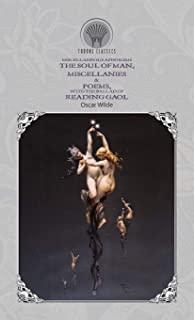
Wilde, Oscar
product information
description
7The Ballad of Reading Gaol is a poem by Oscar Wilde, written in exile in Berneval-le-Grand, after his release from Reading Gaol (/rɛ.dɪŋ.dʒeɪl/) on 19 May 1897. Wilde had been incarcerated in Reading after being convicted of gross indecency with other men in 1895 and sentenced to two years' hard labour in prison.During his imprisonment, on Tuesday, 7 July 1896, a hanging took place. Charles Thomas Wooldridge had been a trooper in the Royal Horse Guards. He was convicted of cutting the throat of his wife, Laura Ellen, earlier that year at Clewer, near Windsor. He was aged 30 when executed.Wilde entered prison on 25 March 1895, sentenced to two years' hard labour-a punishment that was considered more severe than mere penal servitude. He was first sent, briefly, to Newgate Prison for initial processing, and the next week was moved to Pentonville prison, where "hard labour" consisted of many hours of pointless effort in walking a treadmill or picking oakum (separating the fibres in scraps of old navy ropes), and allowed to read only the Bible and The Pilgrim's Progress. Prisoners were not allowed to speak to each other, and, out of their solitary cells, were required to wear a cap with a sort of thick veil so they would not be recognised by other prisoners. A few months later he was moved to Wandsworth Prison, which had a similar regimen. While he was there, he was required to declare bankruptcy, by which he lost virtually all his possessions including his books and manuscripts. On 23 November 1895 he was again moved, to the prison at Reading, which also had similar rules, where he spent the remainder of his sentence, and was assigned the third cell on the third floor of C ward-and thereafter addressed and identified only as "C.3.3.". Prisoners were identified only by their cell numbers and not by name.
member goods
No member items were found under this heading.
Return Policy
All sales are final
Shipping
No special shipping considerations available.
Shipping fees determined at checkout.







